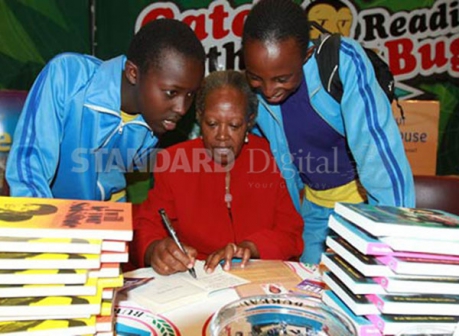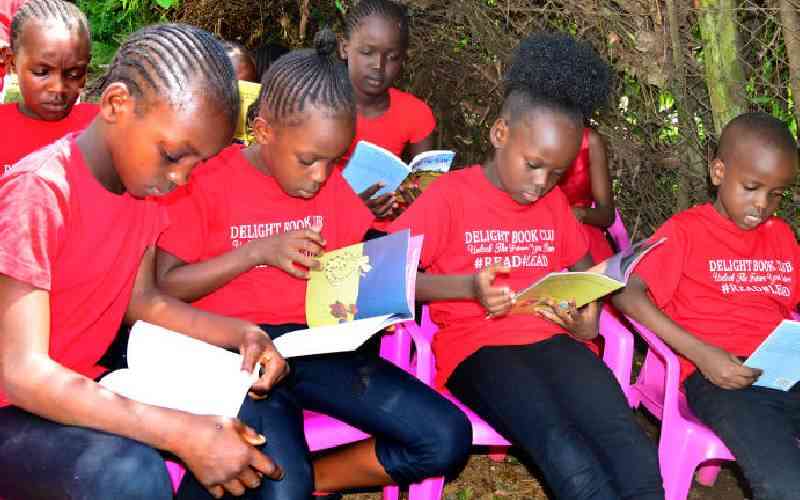
NAIROBI, KENYA: "If the mountain won't come to Muhammad then Muhammad must go to the mountain." In present times, we as Kenyans have found ways to defy all odds on challenges that have echoed these words by Francis Bacon. So how comes we have been unable to use this magical key of technological innovation to transform Kenya into a reading nation?
“Kenyan’s don’t read.” “Kenyans don’t buy books.” “Kenyans are poor readers.” “We don’t have a reading culture in Kenya” on and on the excuses go.
According to the NOP World Culture Score Index, most of these are true. India has the highest hours spent reading per week per person at 10 hours 42 minutes. In Africa, only Egypt and South Africa make the top 30 list.
When the Kenya Certificate of Secondary Education results for 2017 were analysed and it emerged that no student scored an ‘A’ in English there was an uproar.
As an English speaking nation we did what we do best, because we can never accept we are making mistakes and we are to blame. The first action was to discredit the results and postulate that there must have been flaws in the marking process.
When this did not work, we pointed our fingers at the teachers, saying that they must be doing a poor job, amidst all their strikes and requests for higher salaries.
But in truth, we must admit that as a society, we have failed to cultivate a reading culture in our youth as well as in the general population. The fact that no KCSE student scored an ‘A’ in English is an indictement of this failure.
Think about it, when was the last time as a parent you asked your child what storybook they would like to read? During those family Sundays, when you all visit the mall, when was the last time you took your kids to a bookshop just to spend some time looking and picking a book? When was the last time you took a book as a birthday gift? I for one, never give any of my nephews, nieces or any other child I have attended their birthday, any other gift aside from a book.
Since our busy lives must go on, kids no longer go out to play, we have made sure they have cartoon TV shows, they have play stations and other gaming consoles in the house to occupy them all day. So no more ‘cha baba cha mama’ no more ‘kuendesha gari’, which was either dexterously knocking on some tire or pushing some car shell made of wires with wheels made of bottle tops.
We have managed to, or at least are in the process of bringing everything we adults think we need, to us through mobile, but the kids can wait.
We have taught them that adults read news and other important information on the phone as well as catch up with friends on Social Media, on the phone.
In case you need to visit friends you hail a taxi on the phone, in case you need to buy something, you can search & buy it online and have it delivered to you, or go to a shop & pay for it from your phone. In case you need some money, you access your bank through the phone. And in case we are having a good time at home or with friends we can order some food via the phone & have it brought to us. When we must take a much-needed break, we find the coolest holiday spots on the phone.
So bottom line we have a generation that has been conditioned that you no longer go out to the mountain, the mountain should come to you. But then, we take them to school and they wonder why school can’t come to them.
Which they make some very solid argument about, given that they see their parents studying from the comfort of their home, for their Undergraduate,Masters or PHD degrees via distance learning from some University abroad. They also have friends who have learnt to play a guitar or code software programs through online courseware.
Stay informed. Subscribe to our newsletter
Then you tell them they need to read more to become smarter but to get these books they have to go to some Library or wait till they can find it at a bookstore and once again they wonder, why can’t these books come to them.
The worst bit about it is, the books they really want to read are not available at most bookstores, and their parents will only take them to a bookstore once a year to buy books recommended by the school.
Therefore because the bookstores are in business to make money, they will only stock the kind of books bought most. This means that most kids end up reading the same books and therefore not a chance at being better than their competition.
An even sadder trend is that rarely will parents ever ask their children what book they would like to read. We always seem to decide what book we think they would like or they should read.
When I have attended the annual Nairobi International Book Fair, and watched as ardent teens throng the venue from 9am to make the most of the fun and educational event, reading books and taking part in quiz contests. It has left me with the impression of a generation in thirst for knowledge, leading me to conclude that on the matter of reading, our Kenyan society has already stacked the odds against them.
Can we salvage this? Sure, when I was in school, most kids read books based on recommendation by a friend.
A sort of books exchange was what it ended up being. If we borrowed from this concept, a simple mobile application that would enable Kenyans to sell books they have read before and buy other books their friends are selling, would be more like it. Every time they finish reading a book, they can list it up for sale & share it on social media to friends who would then buy it up as well as sell theirs to other friends. For many Book clubs, WhatsApp has been the answer, but an App like this I believe would be the true revelation for them. It would surmount the limitations of variety, accessibility and availability a WhatsApp group would have.
Perhaps only then can we surmount this reading challenge in Kenya; for once again the mountain will have come to Muhammad. Meanwhile as we wait to see these become a reality for us, marking off the 27th to 1st of October, to attend the 20th Nairobi International Bookfair at the Sarit Centre Expo Hall in Westlands Nairobi, Kenya would be a good start to changing this reading culture.
 The Standard Group Plc is a
multi-media organization with investments in media platforms spanning newspaper
print operations, television, radio broadcasting, digital and online services. The
Standard Group is recognized as a leading multi-media house in Kenya with a key
influence in matters of national and international interest.
The Standard Group Plc is a
multi-media organization with investments in media platforms spanning newspaper
print operations, television, radio broadcasting, digital and online services. The
Standard Group is recognized as a leading multi-media house in Kenya with a key
influence in matters of national and international interest.
 The Standard Group Plc is a
multi-media organization with investments in media platforms spanning newspaper
print operations, television, radio broadcasting, digital and online services. The
Standard Group is recognized as a leading multi-media house in Kenya with a key
influence in matters of national and international interest.
The Standard Group Plc is a
multi-media organization with investments in media platforms spanning newspaper
print operations, television, radio broadcasting, digital and online services. The
Standard Group is recognized as a leading multi-media house in Kenya with a key
influence in matters of national and international interest.









